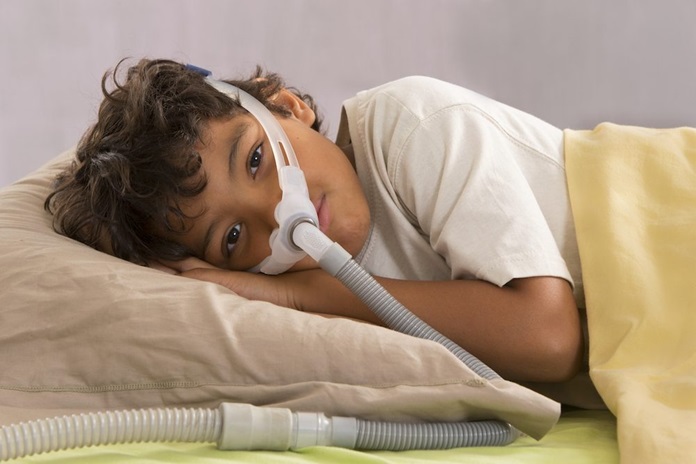A CPAP titration study is an overnight test to adjust CPAP therapy correctly. If you are diagnosed with one of these issues, you might need a CPAP study before starting treatment. Sometimes, the sleep team may do a CPAP titration study on the same night as your sleep study called a split night study. This happens in the second half of the night and is usually for severe sleep apnea cases with a clear diagnosis. The CPAP titration study might be done for milder cases after the doctor reviews your sleep study results. The doctor will decide if you must come in for a CPAP study.
More on CPAP Titration Sleep Study
A CPAP titration sleep study helps find the best airflow rate to treat someone with a breathing disorder during sleep. In this study, a person uses a CPAP machine while sleeping overnight in a lab. During this time, various physical markers are measured through a standard sleep study called polysomnography. These studies usually follow specific steps to adjust the airflow rate to help breathing.
- The CPAP machine is connected to the sleeper and starts with a low air pressure.
- As the person sleeps, the airflow rate is gradually increased.
- When a rate keeps the airway open, preventing breathing lapses, that rate is set for the CPAP machine.
- If the person still has trouble sleeping, humidity can be added to the CPAP air.
- If breathing lapses continue or the person cannot tolerate CPAP, they may switch to a bilevel positive airway pressure (BiPAP) machine, another treatment for sleep apnea.
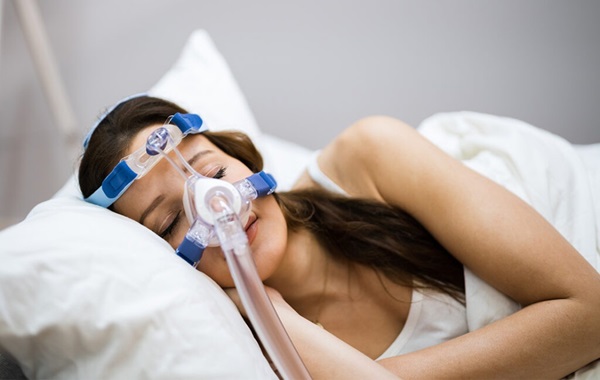
A CPAP titration sleep study is typically required for people who need a CPAP machine that provides a fixed airflow rate throughout the night. Auto-titrating CPAP machines ( APAPs) adjust the airflow based on the sleeper’s needs automatically and do not require professional calibration.
What happens during a CPAP titration study?
During a CPAP titration study, the sleep team adjusts your CPAP machine to find the right air pressure to keep your airway open while you sleep. This helps stop breathing pauses during sleep.
You will arrive for the study in the early evening. They will fit you with a nasal or full-face mask connected to a small machine by a tube. It’s important to let the technologist know if the mask feels uncomfortable or if it leaks air.
The machine has a fan that blows air through the tube and into your mask, which helps keep your airway open by gently blowing air into the back of your throat.
You will have some time to settle in. You will have the room to yourself, with a bathroom available and possibly a TV to watch. When you are ready to sleep, let the sleep technologist know. They will attach sensors to your body to monitor your sleep, just like in a regular sleep study.
These sensors will measure your brain waves, heart rate, breathing, oxygen levels, and arm and leg movements. The wires are long enough for you to move and turn over in bed. You will be asked to move your eyes, clench your teeth, and move your legs to ensure the sensors are working properly.
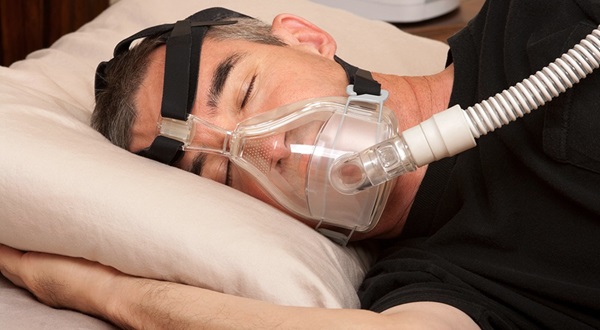
During the night, the technologist will adjust the air pressure you get through your mask remotely. The pressure starts low and gradually increases. If there are any issues, the technologist might come into your room to adjust or replace the mask. Let them know if you feel any discomfort with the treatment.
In the morning, the technologist will test and remove the sensors. Once you are awake and the sensors are off, the CPAP titration study is finished. You can then leave and go back to your regular activities.
Full-Night vs. Split-Night CPAP Titration Study
A full-night CPAP titration study is for people already diagnosed with a sleep-related breathing disorder. The main goal is to adjust the CPAP machine’s airflow to meet the sleeper’s needs.
In a split-night study, the first part of the night diagnoses the cause of sleep-related breathing issues. If a disorder is found, the remaining time is used to adjust the CPAP machine. If there is not enough time to properly calibrate the machine, a follow-up full-night titration study may be needed.
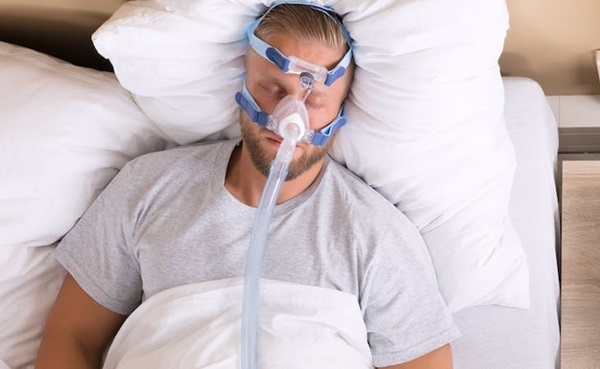
When a person suspected of having a sleep-related breathing disorder undergoes a diagnostic sleep study, they don’t know beforehand if it will become a split-night study. A sleep study may turn into a split-night study if the sleeper shows symptoms of moderate to severe obstructive sleep apnea for at least two hours, and there are at least three hours left for CPAP titration.
Who Needs a CPAP Titration Study?
A CPAP titration study is usually prescribed after someone is diagnosed with sleep apnea or another sleep-related breathing disorder. These disorders are typically diagnosed through polysomnography (PSG), an overnight sleep study done in a lab, or home sleep apnea testing (HSAT), which is an unattended study done at home.
If the sleep study shows that a person has sleep apnea, a doctor might recommend CPAP therapy depending on the type of apnea. Then, the person needs to take part in a second overnight study—a CPAP titration study—to find out the right air pressure needed to reduce breathing disturbances.
Also read, 20 Exercises Postures that Improve your body and reliefs Pain
How to Prepare for a CPAP Titration Sleep Study
Before a CPAP titration sleep study, sleepers are often asked to take certain steps to prepare. Preparation may involve:
- Avoid Caffeine and Alcohol: Refrain from consuming caffeine and alcohol on the day of the study, as they can interfere with sleep quality and affect the results.
- Take Medications as Directed: Consult with your doctor about any medications you are currently taking. Follow their instructions regarding which medications you should take or avoid before the study.
- Follow Your Usual Sleep Schedule: Try to maintain your regular sleep routine in the days leading up to the study. This helps ensure that your sleep patterns during the study are as normal as possible.
- Bring Comfortable Sleepwear: Wear something comfortable and easy to sleep in. Loose-fitting pajamas or sleepwear are ideal.
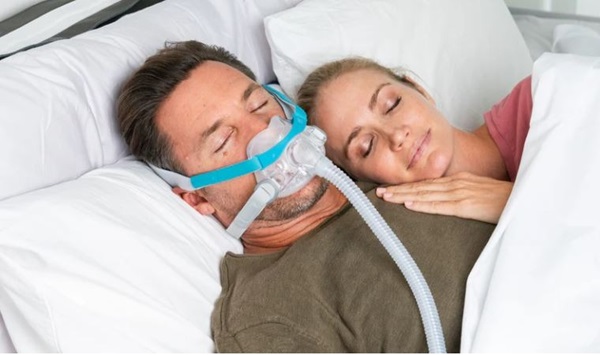
- Pack Personal Items: Bring any items that help you feel more comfortable and relaxed, such as your favorite pillow, blanket, or a book to read before bed.
- Avoid Napping: Try not to nap on the day of the study to ensure that you are tired and ready to sleep at your usual bedtime.
- Maintain Personal Hygiene: Shower and wash your hair to remove any oils or products that could interfere with the sensors. Avoid using lotions, oils, or hair products after showering.
- Eat a Light Meal: Have a light meal before the study, but avoid heavy, rich, or spicy foods that could cause discomfort and disrupt your sleep.
- Arrive Early: Plan to arrive at the sleep center early to allow yourself time to get settled and complete any necessary paperwork.
- Ask Questions: If you have any questions or concerns about the study, don’t hesitate to ask the sleep technologist or your doctor beforehand. This can help reduce any anxiety you might have and ensure you are well-prepared.
Since everyone’s situation is different, it’s important to a doctor or sleep specialist about how to get ready for a CPAP titration sleep study. Don’t change or stop taking any medications without checking with your doctor first.
When to Talk to Your Doctor About a CPAP Titration Study
If you have trouble sleeping or think you have sleep apnea, talk to your doctor to find the right treatment. A CPAP titration study might be part of this process.
If you’re already using a CPAP machine but still have sleep problems, contact your doctor. You might need to adjust the machine settings to better suit your needs.
Additional Tips for Treating Sleep Apnea
While CPAP therapy is the main treatment for obstructive sleep apnea (OSA), other actions can help reduce symptoms:
- Losing weight: If you’re obese or overweight, losing weight can reduce the frequency of breathing interruptions during sleep.
- Exercising: Regular exercise can help lessen OSA symptoms.
- Changing sleep positions: Sleeping on your side instead of your back may improve symptoms for some people.
- Avoiding alcohol: Alcohol can worsen OSA and contribute to weight gain, so it’s best to avoid it, especially before bedtime.
- Checking medications: Some medications can exacerbate OSA symptoms. Consult your doctor or pharmacist to review your medications and address any potential side effects.
Conclusion
In conclusion, a CPAP titration study is an essential step for accurately adjusting CPAP therapy to treat sleep-related breathing disorders effectively. By participating in this overnight test, patients can ensure that their CPAP machine is set to the optimal airflow rate to keep their airway open during sleep, thus preventing breathing interruptions.
Whether conducted as a full-night study or a split-night study, the process involves careful monitoring and adjustments by sleep technologists to find the best settings for each individual. Preparing adequately for the study, following prescribed guidelines, and consulting with healthcare providers can enhance the accuracy and comfort of the procedure. Ultimately, proper CPAP titration not only improves sleep quality but also significantly contributes to overall health and well-being for those diagnosed with sleep apnea or other similar conditions.
Frequently Ask Question
1. What is a CPAP titration study?
A CPAP titration study is an overnight test conducted to determine the optimal air pressure settings for a CPAP (Continuous Positive Airway Pressure) machine. This study helps adjust CPAP therapy to effectively treat sleep-related breathing disorders.
2. When might I need a CPAP titration study?
You might need a CPAP titration study if you have been diagnosed with a sleep-related breathing disorder, such as sleep apnea. This study may be recommended after your initial sleep study results are reviewed by a doctor.
3. What is a split-night study?
A split-night study is a type of sleep study where the first part of the night is used to diagnose sleep-related breathing issues, and the second part is used to adjust the CPAP machine settings if a disorder is detected. This is often done in severe cases of sleep apnea with a clear diagnosis.
4. How is a CPAP titration study conducted?
During a CPAP titration study, you sleep overnight in a lab with a CPAP machine connected to you. The airflow rate is gradually adjusted throughout the night to find the optimal pressure that keeps your airway open and prevents breathing lapses. Various physical markers, such as brain waves, heart rate, breathing, and oxygen levels, are monitored through polysomnography.
5. What is the difference between a full-night and a split-night CPAP titration study?
A full-night CPAP titration study is conducted for individuals already diagnosed with a sleep-related breathing disorder, focusing solely on adjusting the CPAP machine settings. In contrast, a split-night study diagnoses the disorder in the first part of the night and adjusts the CPAP settings in the second part if a disorder is found.
You may also like to read, Explore The Benefits and Considerations of Sleeping Naked
